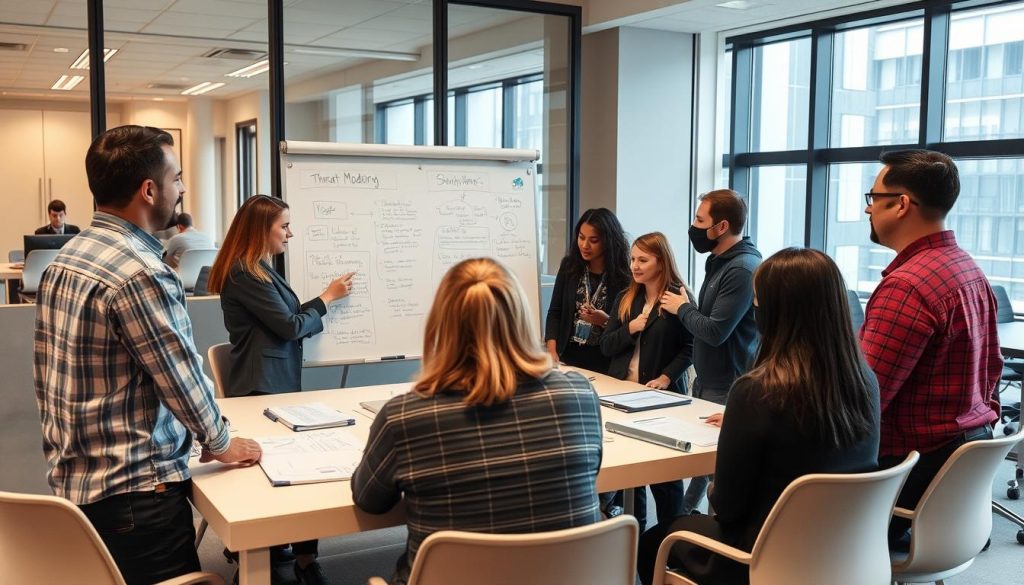In today’s rapidly evolving digital landscape, integrating security into your DevOps practices isn’t just a recommendation—it’s a necessity. At Opsio, we deliver comprehensive DevSecOps consulting services that transform your development pipeline into a secure, efficient, and compliant system without sacrificing speed or agility. Our expert team helps organizations embed security as code throughout the entire development lifecycle, ensuring vulnerabilities are caught early and remediated quickly.
Comprehensive DevSecOps Consulting to Secure Your DevOps Pipeline
Traditional security approaches often treat security as a final checkpoint, creating bottlenecks and leaving vulnerabilities undetected until late in development. DevSecOps fundamentally changes this paradigm by making security an integral part of every development stage.
The Cost of Security Breaches
Security vulnerabilities discovered late in development can cost up to 30x more to fix than those caught during coding. Beyond direct costs, data breaches damage reputation and customer trust—assets that take years to build but moments to destroy.
Benefits of Early Security Integration
- Reduced development costs through early vulnerability detection
- Accelerated release cycles with automated security testing
- Enhanced compliance posture with continuous validation
- Improved collaboration between development and security teams
- Decreased risk of production security incidents
Opsio’s DevSecOps Strategy Development Expertise
With over a decade of experience in both security and DevOps, Opsio brings unparalleled expertise to your DevSecOps transformation. Our consultants have implemented secure pipelines across industries including finance, healthcare, and government—sectors where security isn’t just important, it’s mandatory.
Holistic Assessment
We evaluate your current DevOps practices, security posture, and organizational culture to identify gaps and opportunities for security integration.
Tailored Roadmaps
Our experts develop customized implementation plans that align with your business objectives, technology stack, and compliance requirements.
Measurable Outcomes
We establish clear metrics and KPIs to track the effectiveness of your DevSecOps transformation, ensuring tangible security improvements.
Security Automation for CI/CD Pipelines
Effective DevSecOps implementation requires automating security checks throughout your CI/CD pipeline. Opsio helps you integrate the right tools and processes to catch vulnerabilities without slowing down development.
Our Security Automation Services Include:
- Static Application Security Testing (SAST) integration
- Dynamic Application Security Testing (DAST) automation
- Software Composition Analysis (SCA) for dependency scanning
- Infrastructure as Code (IaC) security validation
- Automated compliance checks and reporting
- Security test orchestration and result aggregation
Compliance-as-Code Implementation
Meeting regulatory requirements doesn’t have to be a manual, time-consuming process. Our compliance-as-code approach transforms complex regulatory frameworks into automated, testable controls integrated directly into your development pipeline.
Key Benefits of Our Compliance-as-Code Approach:
Continuous Compliance
Maintain a constant state of compliance through automated checks rather than point-in-time assessments.
Automated Documentation
Generate audit-ready evidence and documentation automatically as part of your development process.
Adaptable Controls
Quickly adapt to changing regulations by updating code rather than retraining staff or revising manual processes.
Cloud Infrastructure Security Hardening
Cloud environments require specialized security approaches that account for shared responsibility models and dynamic infrastructure. Opsio’s cloud security experts help you implement robust controls across your cloud resources.
Our Cloud Security Hardening Services:
- Cloud configuration security posture management
- Identity and access management optimization
- Network security architecture design
- Data protection and encryption implementation
- Serverless and container security hardening
- Cloud security monitoring and incident response
Container Security Management
Containers revolutionize application deployment but introduce unique security challenges. Our container security management services ensure your containerized applications remain secure from development through runtime.
Build-Time Security
- Base image vulnerability scanning
- Dependency analysis and management
- Secure configuration validation
- Image signing and provenance
Distribution Security
- Private registry implementation
- Image promotion workflows
- Policy-based deployment controls
- Supply chain verification
Runtime Security
- Container runtime protection
- Network policy enforcement
- Behavioral monitoring
- Incident detection and response
Threat Modeling Workshops
Proactive security begins with understanding potential threats. Our threat modeling workshops help your teams identify, prioritize, and mitigate security risks before they become vulnerabilities.
Our Threat Modeling Approach:
- Identify assets and trust boundaries
- Map data flows and entry points
- Apply threat frameworks (STRIDE, PASTA, etc.)
- Evaluate attack vectors and likelihood
- Develop mitigation strategies
- Integrate findings into development backlog
DevOps vs. DevSecOps: The Opsio Advantage
Understanding the differences between traditional DevOps and DevSecOps is crucial for organizations looking to enhance their security posture while maintaining development velocity.
| Aspect | Traditional DevOps | Opsio’s DevSecOps Approach |
| Security Integration | Security as a final stage or separate process | Security embedded throughout the entire pipeline |
| Responsibility | Security team owns security | Shared responsibility across all teams |
| Testing Approach | Manual security testing, often causing delays | Automated security testing integrated with CI/CD |
| Compliance | Point-in-time assessments | Continuous compliance validation |
| Vulnerability Management | Reactive, post-deployment remediation | Proactive identification and prevention |
| Development Speed | Often slowed by security reviews | Maintained or improved with parallel security processes |
Actionable Tips for DevSecOps Adoption
Successfully implementing DevSecOps requires more than just tools—it demands cultural shifts, process changes, and strategic planning. Here are key recommendations based on our experience with hundreds of successful implementations:
Start with Culture
Begin by fostering a security-minded culture where all team members understand their role in creating secure applications. Conduct cross-functional training and establish shared security objectives.
Implement Incrementally
Avoid overwhelming teams with too many changes at once. Start with high-impact, low-friction security controls and gradually expand your DevSecOps practices as teams adapt.
Measure and Improve
Establish clear security metrics that balance risk reduction with development velocity. Use these metrics to demonstrate value and continuously refine your approach.
Frequently Asked Questions
How long does a typical DevSecOps implementation take?
Implementation timelines vary based on your organization’s size, current DevOps maturity, and specific security requirements. Initial improvements can be realized within 4-6 weeks, while comprehensive transformations typically take 3-6 months. We focus on delivering incremental value throughout the process rather than waiting for a “big bang” implementation.
Will implementing DevSecOps slow down our development process?
When implemented correctly, DevSecOps should maintain or even improve development velocity. By catching security issues earlier in the development cycle, you actually reduce the time-consuming rework that occurs when vulnerabilities are discovered late. Our approach focuses on automation and integration that minimizes disruption to developer workflows.
How do you measure the ROI of DevSecOps consulting services?
We measure ROI through multiple metrics, including: reduction in security vulnerabilities, decreased time to remediate issues, improved compliance posture, reduced security incident costs, and increased development velocity. We establish baseline measurements before implementation and track improvements over time to demonstrate concrete value.
What industries do you specialize in for DevSecOps consulting?
While our DevSecOps methodology works across industries, we have particular expertise in financial services, healthcare, government, and e-commerce—sectors with stringent security and compliance requirements. Our consultants bring industry-specific knowledge of regulations and security best practices relevant to your business context.
Transform Your Development Pipeline with Opsio’s DevSecOps Expertise
In today’s threat landscape, security can’t be an afterthought. Opsio’s comprehensive DevSecOps consulting services help you build security into every stage of your development process, ensuring your applications are both secure and delivered on time.
From strategy development to implementation and ongoing optimization, our team of security and DevOps experts will guide you through the entire transformation journey. The result is a more secure, compliant, and efficient development pipeline that supports your business objectives.




